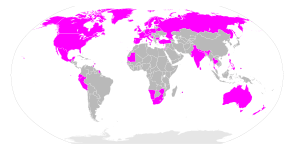
Recognition of marital rape in Pakistani Law
Encyclopedia
There is no legal Recognition of Marital Rape in Pakistani law. Subjects covered within marital rape
are delineated in multiple separate laws governing the people of Pakistan
. The first is the Hudood Ordinance
, an implementation of Islamic Shari'a law enacted in 1979. The second is the 2006 Women's Protection Bill
which reformed many Hudood Ordinance laws that covered rape and adultery in Pakistan. Neither law provides a basis for prosecuting the perpetrators of marital rape.
 Prior to 1979, instances of marital rape were under the purview of family law instead of criminal law. With the passage of the Hudood Ordinance in 1979, women were required to have four male witnesses to any rape to corroborate any accusation of rape. If they failed to provide such witnesses, they were convicted of zina
Prior to 1979, instances of marital rape were under the purview of family law instead of criminal law. With the passage of the Hudood Ordinance in 1979, women were required to have four male witnesses to any rape to corroborate any accusation of rape. If they failed to provide such witnesses, they were convicted of zina
, or extramarital sex.
. The bill enabled judges to try rape cases in criminal court instead of Islamic court. These moves ended the need for multiple male witnesses to a rape in order to prosecute. It eliminated the sentence of death for consensual pre-marital sex, reducing the maximum penalty to five years imprisonment and a fine. However, marital rape remains excluded from being prosecuted as rape. It also requires that formal charges be brought in cases of an accusation of extramarital sex in order to jail the accused.
within marriage. This concept continues to be recognized as law in Pakistan. There are no recorded cases of marital rape being successfully prosecuted against legally married couples in Pakistan.
Spousal rape
Marital rape, also known as spousal rape, is non-consensual sex in which the perpetrator is the victim's spouse. As such, it as a form of partner rape, of domestic violence, and of sexual abuse. Once widely condoned or ignored by law, spousal rape is now repudiated by international conventions and...
are delineated in multiple separate laws governing the people of Pakistan
Pakistan
Pakistan , officially the Islamic Republic of Pakistan is a sovereign state in South Asia. It has a coastline along the Arabian Sea and the Gulf of Oman in the south and is bordered by Afghanistan and Iran in the west, India in the east and China in the far northeast. In the north, Tajikistan...
. The first is the Hudood Ordinance
Hudood Ordinance
The Hudood Ordinance was a law in Pakistan that was enacted in 1979 as part of then-military ruler Muhammad Zia-ul-Haq's Islamization and replaced or revised in 2006 by the Women's Protection Bill....
, an implementation of Islamic Shari'a law enacted in 1979. The second is the 2006 Women's Protection Bill
Women's Protection Bill
The Women's Protection Bill which was passed by the National Assembly of Pakistan on 15 November 2006 is an attempt to amend the heavily criticized Hudood Ordinance laws which govern the punishment for rape and adultery in Pakistan.-Impact of the Bill:...
which reformed many Hudood Ordinance laws that covered rape and adultery in Pakistan. Neither law provides a basis for prosecuting the perpetrators of marital rape.
Hudood Ordinance and Shari'a Law

Zina (Arabic)
Zinā or Zināʾ is generally defined by Islamic Law as unlawful sexual intercourse, i.e. intercourse between a man and a woman who are not married to one another or in a state of lawful concubinage based on ownership...
, or extramarital sex.
Women's Protection Bill
The Women's Protection Bill, passed on 15 November 2006, moved the prosecution of rape cases from the Hudood Ordinance to Pakistan's secular penal codePakistan penal code
The Pakistan Penal Code usually called PPC is a penal code for all offences charged in Pakistan. It was originally prepared by Lord Macaulay with a great consultation in 1860 on the behalf of the Government of British India as the Indian Penal Code...
. The bill enabled judges to try rape cases in criminal court instead of Islamic court. These moves ended the need for multiple male witnesses to a rape in order to prosecute. It eliminated the sentence of death for consensual pre-marital sex, reducing the maximum penalty to five years imprisonment and a fine. However, marital rape remains excluded from being prosecuted as rape. It also requires that formal charges be brought in cases of an accusation of extramarital sex in order to jail the accused.
Women's Rights in Marriage
There has, historically, been a conception of the conjugal rightConjugal right
Conjugal right*Marriage#Sex*Conjugal visit*Droit de seigneur*Spousal rape...
within marriage. This concept continues to be recognized as law in Pakistan. There are no recorded cases of marital rape being successfully prosecuted against legally married couples in Pakistan.

